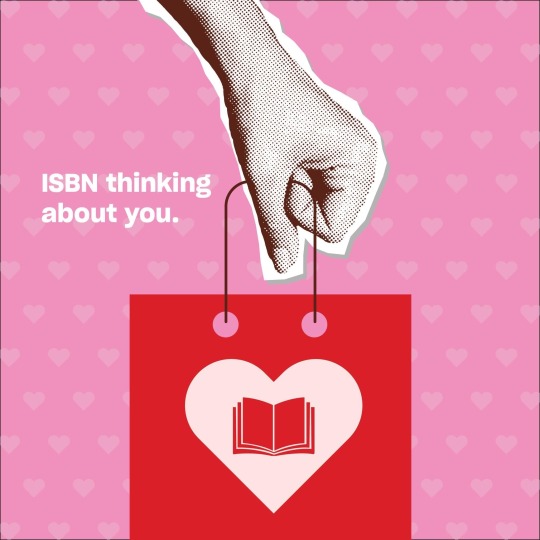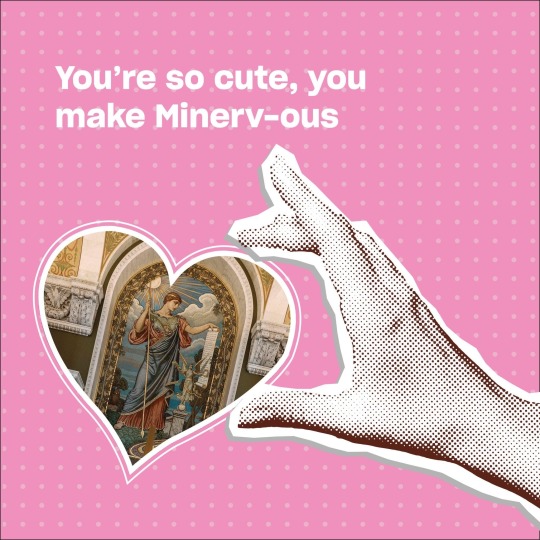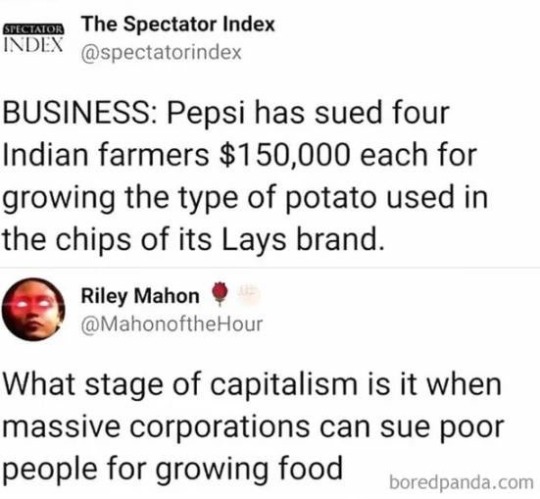Text
libby app guide
aka how to support libraries and get books and audiobooks for free without pirating them.

disclaimer: this is so easy. it is also really fun.
one: download the libby app. you'll open it and it'll ask you to add a library.
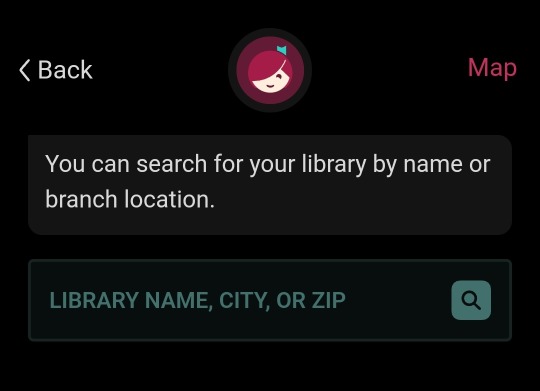
two: get a library card. don't have one? good news, it's really easy and i am saying this as the laziest person on earth. it varies what you need to have to get a card library to library but almost all libraries will let you get one online. i have a card for my home town and for the town i moved to. sometimes you only need an email address, sometimes you need an area code. to get mine it took me about 5 minutes of lying on the couch aimlessly tapping on my phone. follow your heart. you can get cards for places you don't currently live. i will leave the ethics of that up to you but it's probably better than pirating and either way you're creating traffic for libraries which is what they need to exist.
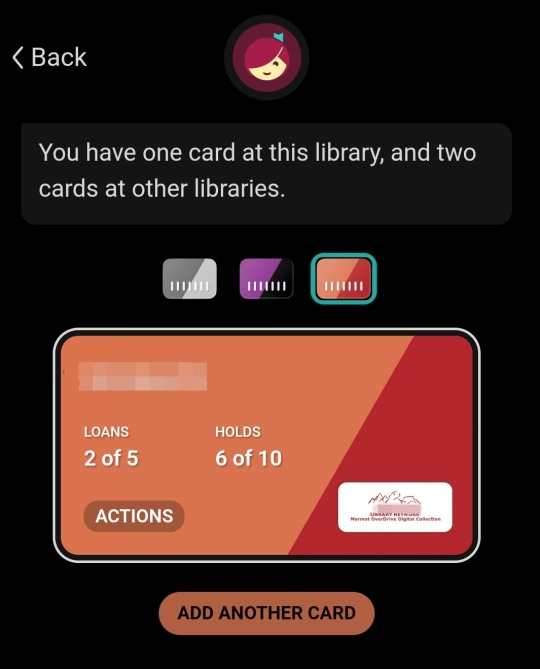
three: add your card. you can add multiple cards for multiple libraries. you need the number. i have never had libby fail to recognize a valid account.
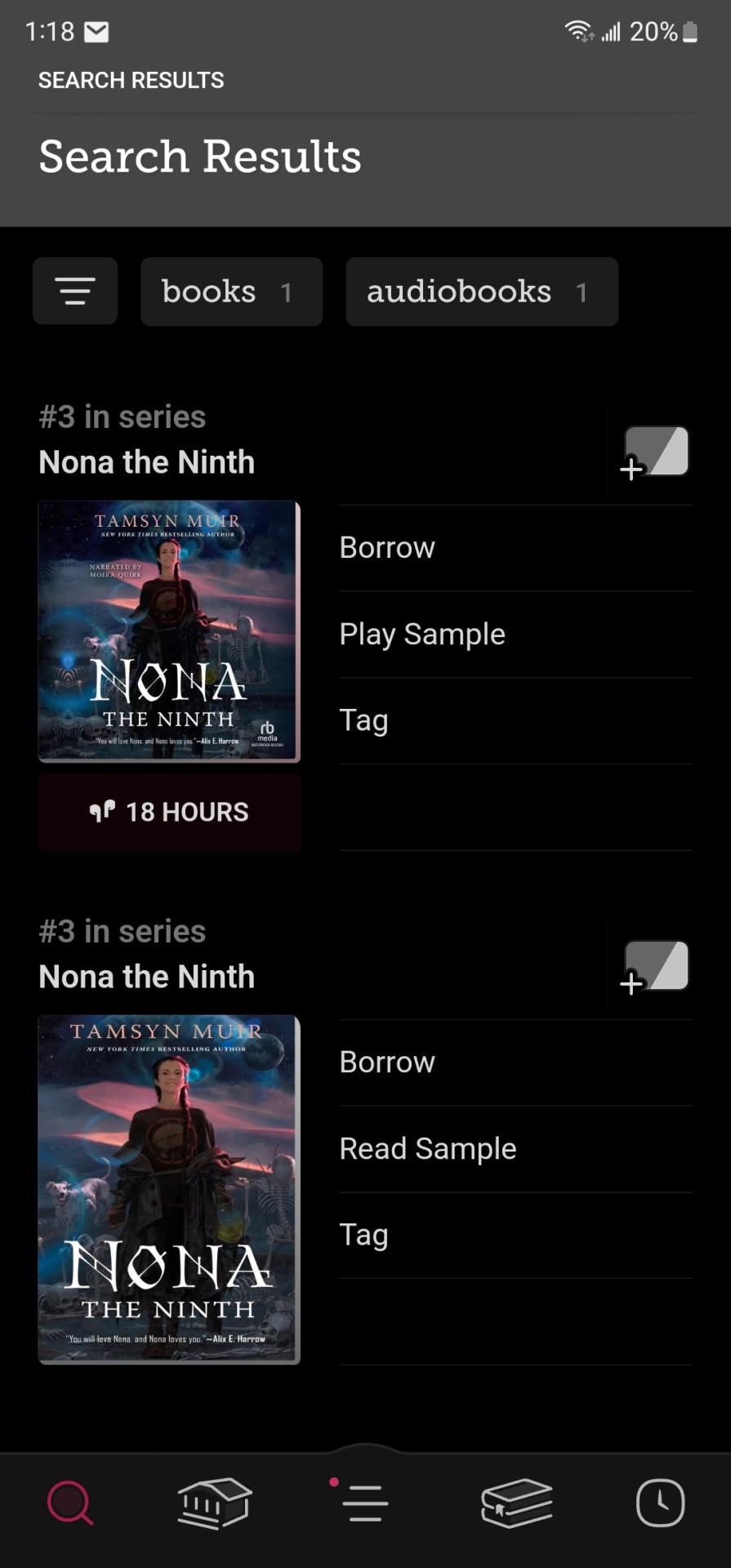
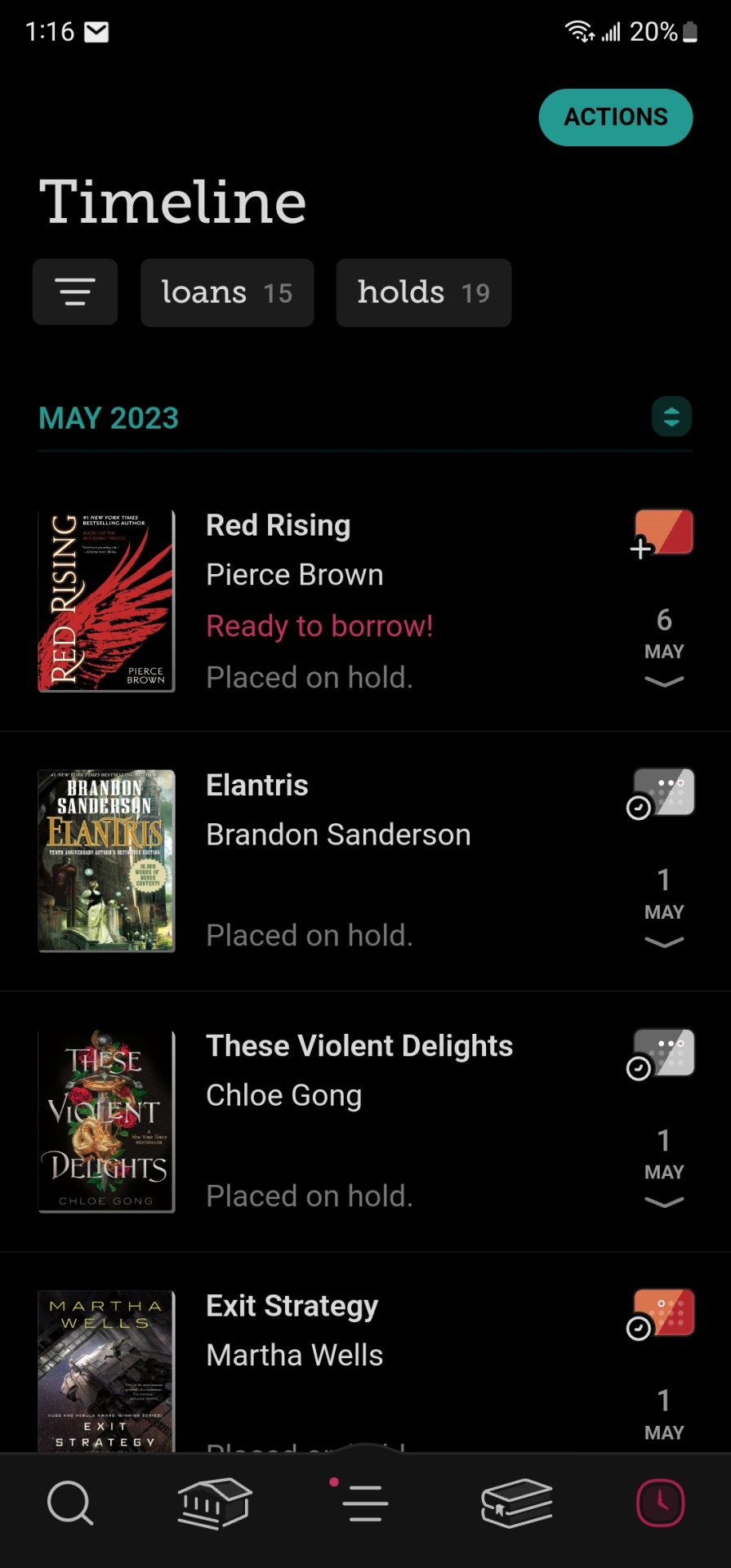
four: search for your book! some will be ready to borrow right away. others have an estimated delivery time. libby will always pick the one that's the fastest from the options available at all the libraries you have cards at. you can borrow audiobooks and ebooks. libby will send you a notification when you're book is ready to borrow. in my experience it's a lot faster than the estimate. if you aren't ready to read it, you can ask to be skipped over in line so you keep your place at the front but let someone else read it first.

five: read it!!! kindle is the most common way to do this. you can go to your loan and click read with kindle. it'll download it to all your devices where you have kindle. as long as you have the loan, it'll act like your book. when the loan ends, if the device is connected to the internet, it'll automatically be returned. it will save all your notes and highlights. (if you disconnect your device from the internet, it won't return the book. weewoo.)
anyway in case anyone else has been wondering about it, i really love it. is a nice surprise to see what i'm going to get and it's cut my reading costs down big time! it's also neat because i get to synch my books between devices unlike downloading books through cough cough other means. good luck!
27K notes
·
View notes
Text
We might share a few of these essays over the next few weeks/months, but this roundup from @jstor Daily's editors was too good not to share!
171 notes
·
View notes
Text
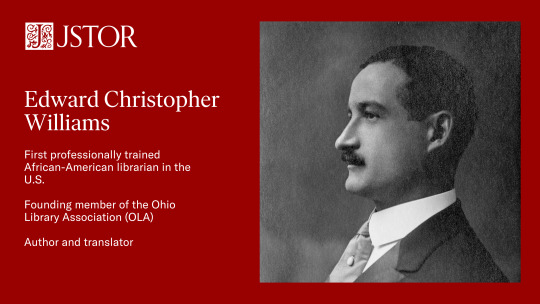
Edward Christopher Williams (11 Feb. 1871 - 24 Dec. 1929) was a pioneering African American librarian, educator, and scholar who played a vital role in shaping library collections at Western Reserve University (WRU) and Howard University. Born in Cleveland to Daniel P. Williams, a prominent African American figure, and Mary Kilkary Williams, a Clevelander of Irish descent, Williams embarked on a remarkable journey of academic and professional achievement.
Graduating from Adelbert College of WRU in 1892, Williams quickly made his mark as he assumed the role of first assistant librarian at the institution. His dedication and expertise saw him ascend to the position of head librarian in 1894 and university librarian in 1898. Eager to deepen his knowledge, Williams pursued further studies in library science at the New York Library School in Albany, completing the rigorous 2-year program in just one year.
Williams's impact on WRU's library was profound; he significantly expanded its collection and elevated its standards, establishing himself as an authority in library organization and bibliography. His advocacy for the establishment of a school of library science at WRU led to its inception in 1904, where he became an esteemed instructor, offering courses in reference work, bibliography, public documents, and book selection.
A founding member of the Ohio Library Association, Williams played a pivotal role in shaping its constitution and direction. However, in 1909, he left Cleveland to assume the role of principal at M St. High School in Washington, D.C. His tenure there was marked by his unwavering commitment to education and leadership.
In 1916, Williams joined Howard University as university librarian, further cementing his legacy in the realm of academia. Not only did he oversee the university's library, but he also directed Howard's library training class, taught German, and later chaired the Department of Romance Languages.
In pursuit of academic excellence, Williams embarked on a sabbatical in 1929 to pursue a Ph.D. at Columbia University. Tragically, his studies were cut short by his untimely passing later that year.
In 1902, Williams married Ethel P. Chesnutt, the daughter of Charles Chesnutt, a renowned author. Their union bore one son, Charles, who would carry on his father's legacy in the years to come.
Read more about Edward Christopher Williams here.
158 notes
·
View notes
Text

Effie Lee Morris stands as a towering figure in the realm of children's literature and library services, leaving an indelible mark through her visionary leadership and tireless advocacy. Born into an era marked by racial segregation and systemic barriers, Morris defied the odds, rising to become a beacon of change and progress. Her journey began as a public librarian in Cleveland and later in the Bronx, where she cultivated a deep appreciation for the transformative power of literature and education.
In 1971, Effie Lee Morris shattered barriers as the first African-American president of the Public Library Association, a milestone that underscored her commitment to equity and inclusion in library spaces. Her groundbreaking work extended beyond administrative roles; Morris played a pivotal role in shaping the landscape of children's literature by spearheading the establishment of the Coretta Scott King Award. By crafting the original selection criteria in 1970, she laid the foundation for recognizing and celebrating African-American authors and illustrators, ensuring their voices resonated prominently in the literary world.
Morris's impact reverberated within the walls of the San Francisco Public Library (SFPL), where she assumed the role of the first coordinator of children's services. During her tenure, she revolutionized children's literature by establishing a research collection of out-of-print books, meticulously documenting the evolving portrayals of ethnic and culturally diverse groups. This collection, later renamed the Effie Lee Morris Historical and Research Collection in her honor, served as a testament to her unwavering dedication to preserving diverse narratives and fostering cultural understanding.
Beyond her professional achievements, Morris's advocacy extended into the realm of social justice and community engagement. She founded the San Francisco chapter of the Women's National Book Association and actively participated in the American Library Association's Social Responsibilities Round Table, championing causes aimed at combating racism, inequality, and poverty. Her contributions were met with widespread recognition, as evidenced by numerous accolades, including the Silver Spur Award and the Grolier Foundation Award, affirming her status as a trailblazer in the literary landscape.
Effie Lee Morris's legacy transcends generations, inspiring future leaders and storytellers to uphold the values of diversity, inclusion, and equity in children's literature and library services. Her visionary spirit lives on in the countless lives touched by her work, serving as a timeless reminder of the transformative power of literature in bridging cultures, fostering empathy, and igniting change.
Read more about Effie Lee Morris here.
235 notes
·
View notes
Text
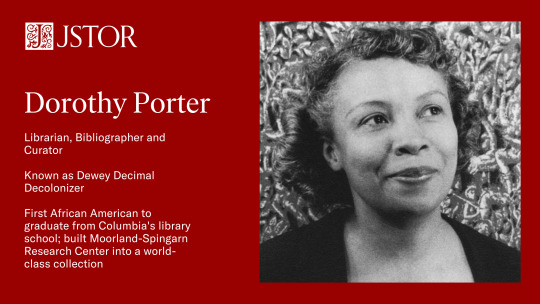
Dorothy Porter is known as the "Dewey Decimal Decolonizer."
Dorothy Porter was an African American librarian who worked to challenge and decolonize library systems, including the Dewey Decimal System, which traditionally marginalized non-Western perspectives and cultures. She advocated for more inclusive classification systems that better represented diverse voices and histories.
Porter's work emphasized the importance of equity and representation within library collections, aiming to create spaces that reflect the richness and complexity of human experiences. Her efforts have contributed to ongoing discussions and actions toward decolonizing library practices worldwide.
Read more about Dorothy Porter here.
2K notes
·
View notes
Text
"The push towards independence in disabled communities, although well-intentioned, might inadvertently deprive autistics of these essential human connections, in an otherwise hyper-connected world."
124 notes
·
View notes
Text
0 notes
Photo
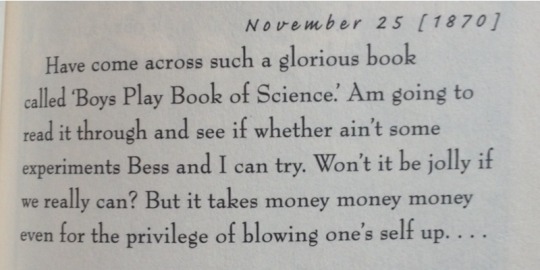
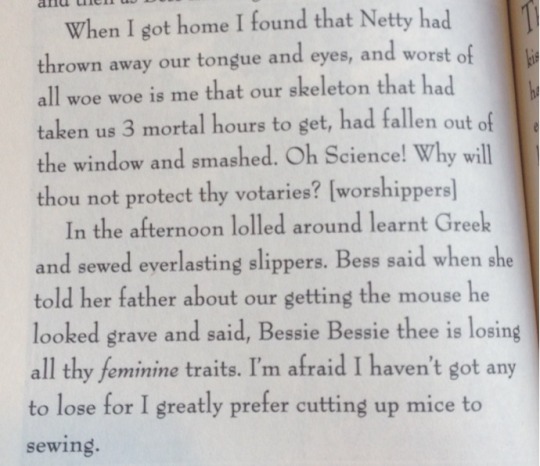
this is from a real diary by a 13-year-old girl in 1870. teenage girls are awesome and they’ve always been that way.
185K notes
·
View notes
Text
15K notes
·
View notes
Text
1 note
·
View note
Text
youtube
Burned to the Ground: the Canadian village incinerated by record temperatures, June 8, 2023
The small village of Lytton in British Columbia hit the global media when it smashed Canada's highest temperature ever recorded in June 2021, at 49.6 degrees centigrade.
Two days later, the entire village had burned to the ground. In the ashes of their homes, this cohesive but diverse community which includes a majority of First Nations residents had to confront the realities of climate displacement by being relocated away from their ancestral lands. Through the stories of three main protagonists we find a community searching for answers while relying on a collective spirit to heal.
The Guardian
@allthecanadianpolitics
435 notes
·
View notes
Text
8 notes
·
View notes
Photo
Whitney Museum of Modern Art available for purchase:
https://shop.whitney.org/black-power-abc-s-card-set.html
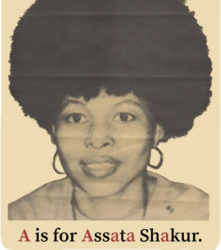
Black Power ABC’s
Who’s On The Cards?
A is for Angela Davis
Angela Yvonne Davis, activist, educator, scholar, and politician, was born on January 26, 1944, in the “Dynamite Hill” area of Birmingham, Alabama. The area received that name because so many African American homes in this middle class neighborhood had been bombed over the years by the Ku Klux Klan. Her father, Frank Davis, was a service station owner and her mother, Sallye Davis, was an elementary school teacher. Davis’s mother was also active in the National Association for the Advancement of Colored People (NAACP), when it was dangerous to be openly associated with the organization because of its civil rights activities. Angela Davis emerged as a prominent figure in the Black Power Movement as a member of the Black Panther and Communist Parties. Davis later went on to become a University Professor, and has authored numerous books about issues of race, class, and gender, while continuing to fight for the liberation of black people across the world.
https://www.youtube.com/watch?v=R2BIZy0HScM
https://www.youtube.com/watch?v=s6ZP7U1Wnbo
B is for Black Power
Black Power is a political ideology and rallying cry first uttered by SNCC chairman Stokely Carmichael. Carmichael described Black Power as “a call for black people in this country to unite, to recognize their heritage, to build a sense of community [and]… to define their own goals, [and] lead their own organizations.”
https://www.youtube.com/watch?v=zxrzTsfpPfM
C is for Amilcar Cabral
Amilcar Cabral was a Guinea-Bissauan revolutionary and anti-colonial leader. Cabral founded the African Party for the Independence of Guinea-Bissau and Cape Verde, which led the nationalist movements of Guinea-Bissau and Cape Verde and the war of Independence in Guinea-Bissau. He was assassinated on January 20th, 1973, about eight months after Guinea-Bissau declared their independence.
https://www.youtube.com/watch?v=CVZoxudN_Rk&t=2s
D is for Self-Determination
Self determination means the ability to define oneself, to choose one’s own political leaders, to establish one’s own aesthetics and art forms, and to exist outside of the definitions imposed upon yourself by others.
E is for Elaine Brown
Elaine Brown is a political activist and artist who was the only woman to serve as chairperson of the Black Panther Party. Brown was an integral part in the development of the Black Panther Liberation School. Elaine Brown continues to advocate and work for the liberation of black people across the world to this day.
https://www.youtube.com/watch?v=H0aOJaEa1m0
https://www.youtube.com/watch?v=BieUw5CKH_s
F is for Franz Fanon
Franz Omar Fanon was an Afro-Caribbean psychiatrist, physician, philosopher, writer, and revolutionary. As a young man, Fanon fought as a revolutionary soldier in the Algerian War of Independence. Later in life, his books Black Skin, White Masks, and The Wretched of the Earth became foundational texts in the world of anti-colonial theory.
https://www.youtube.com/watch?v=J4fQ7KwKgFA
G is for Grenada
Grenada is a Caribbean island which experienced a bloodless revolution in March of 1979, when the New Jewel Movement, led by Maurice Bishop, assumed power of the government in an armed takeover. Grenada served as a site of inspiration across the African diaspora, as evidence that a revolutionary party can take and keep power without extreme bloodshed.
https://www.youtube.com/watch?v=aI45fixtxLU
H is for Homecooked
Revolutionaries need to eat. Homecooked meals often served as the fuel that allowed revolutionaries to heal and continue their struggle for liberation.
J is for Julian Bond
Julian Bond was an American political activist who helped found the Student Nonviolent Coordinating Committee(SNCC) and served as the organization’s communications director for its first five years. In 1965, at the young age of 25, Bond was elected to a seat in the Georgia State Legislature.
https://www.youtube.com/watch?v=shKCcw0EzHU
https://www.youtube.com/watch?v=cb7g8qDsOvg
K is for Kwame Nkurmah
Kwame Nkurmah was the first prime minister and president of Ghana, after leading Ghana to independence in 1957. Nkrumah was also a founding member of the Organization for African Unity, and a foremost advocate of of Pan-Africanism.
https://www.youtube.com/watch?v=DIr09k_LMoE
L is for Lowndes County
Lowndes County, Alabama, is an 80% black county in Alabama that had no black registered voters in 1965. Under the direction of SNCC, black voters in Lowndes county were registered to vote, and the Lowndes County Freedom Organization was formed, an independent political organization which ran multiple candidates for office in county elections. Although no candidates were elected to office, the Lowndes County Freedom Organization and their symbol of the black panther served as the inspiration for the Black Panther Party.
M is for Marcia Griffiths
Marcia Griffiths is a Jamaican singer and songwriter, and member of the I Threes, the group which sang the harmonious back up vocals for Bob Marley at the heights of his career. Griffiths went on to write and sing the song, Electric Boogie, a song whose accompanying dance has since become a staple of black parties and gatherings in the US.
https://www.youtube.com/watch?v=97OtsR8L1NY
N is for Nina Simone
Nina Simone is an african-american singer, songwriter, and activist whose songs like To Be Young Gifted and Black and Backlash Blues provided a soundtrack to the Black Power Movement.
https://www.youtube.com/watch?v=_hdVFiANBTk
O is for Organize
The struggle for Black Power was organized and intentional. Organization meant establishing political parties with explicit goals, planning events to reach people, building coalitions and much more.
https://www.youtube.com/watch?v=JN8mNBf56I4
P is for Pan African
Pan-Africanism is an intellectual, political, and cultural movement which asserts that all people of African descent have common interests and goals around which they should be unified.
https://www.youtube.com/watch?v=mn12bNvt1sY
Q is for Queer
Black people cannot be free unless all black people are free, and that includes queer black people. Queer people were vital in the movement for Black Power, although they are rarely included in its history.
https://www.youtube.com/watch?v=T_XQU2_fF5E
R is for Rastafari
Rastafari is a revolutionary religious and political system originating in the Caribbean island of Jamaica. Rastafari seeks to affirm blackness in the face of a white supremacist world, and is best known for its aesthetic and artistic aspects, such as dreadlocks, dread talk, and reggae music.
S is for SNCC
SNCC, or the the Student Nonviolent Coordinating Committee, was a political organization primarily made up of students and young people which was one of the most radical and important groups of the Black Power Movement. SNCC organized the Freedom Rides, which aimed to desegregate buses in the south, Freedom Summer, which aimed to register voters throughout the south, and The Lowndes County Freedom Organization, which served as the inspiration for the Black Panther Party.
T is for Tanzania
Tanzania is an African country whose capital city, Dar es Salaam, served as a meeting site for African revolutionaries fighting for independence throughout the late 1960’s and 70’s.
U is for Us
We are important, and must take care of each other. Revolution cannot be just be about individuals, but must be about “us”.
V is for Brother Valentino
Brother Valentino is a Grenadian born calypso artist, whose songs like Stay up Zimbabwe and Barking Dogs expressed a revolutionary sentiment and served as the music and sound to the Black Power Movement.
W is for Walter Rodney
Walter Rodney was a prominent Guyanese scholar, theorist, and activist, whose writings and speeches about the ideology of Black Power were extremely influential throughout the Black Power Movement and across the diaspora. Rodney was a professor at the University of the West Indies in Jamaica, before being banned from the country, and later served as a leader of the Working People’s Alliance in Guyana, before being assassinated.
X is for Malcolm X
Malcolm X was an African-American Muslim minister and political leader, who rose to prominence as a leader within the Nation of Islam. Malcolm X was a staunch advocate for black self-determination, and argued for liberation “by any means necessary,” and for the creation of an autonomous black state.
Y is for The Young Lords
The Young Lords was a Puerto Rican nationalist group based in Chicago and New york, which advocated for Puerto Rican independence and the liberation of Afro-Latinx people living in the U.S. The Young Lords carried out many direct-action occupations of vacant land, hospitals, churches and other institutions to demand that they operate programs for the poor.
Z is for David Ze
David Ze was an Angolan musical artist and revolutionary who was a member of Agostinho Neto’s Popular Movement for the Liberation of Angola.
This collection also includes an extra card, which could be used in place of or in addition to the A for Angela Davis Card. The card was included in the deck as it allows you to use this collection with variation, starting with a different card every time you use the deck to teach. It was also important to include this extra card, as both Angela Davis and Assata Shakur are figures of extreme importance to the Black Power Movement, whose knowledge must be passed to the next generation.
A is for Assata Shakur
Assata Shakur is an american activist, scholar, and revolutionary who was a member of the Black Panther Party and Black Liberation Army. Shakur is currently living as a fugitive in Cuba, where she has been granted political asylum from the U.S. government. Shakur’s affirmation chant, “it is our duty to fight for freedom. It is our duty to win. We must love each other and support each other. We have nothing to lose but our chains,” is recited at protests across the country to this day (if comfortable, please recite this chant with your children).
12 notes
·
View notes
Text
5 notes
·
View notes
Text
0 notes

